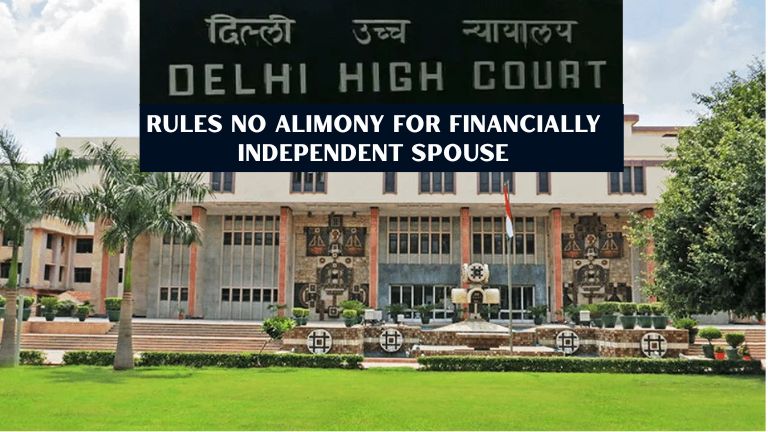
Court says alimony is meant to prevent destitution, not equalise financial status
Burden lies on spouse seeking maintenance to prove genuine financial need
By Our Legal Reporter
New Delhi: October 23, 2025: In a significant judgment, the Delhi High Court has ruled that a spouse who is financially self-sufficient and independent is not entitled to alimony after divorce. The Court clarified that the purpose of alimony under Section 25 of the Hindu Marriage Act, 1955 is to prevent destitution and ensure financial justice, not to create financial parity between two capable individuals.
The ruling came from a Division Bench of Justice Anil Kshetrapal and Justice Harish Vaidyanathan Shankar, who dismissed an appeal filed by a woman officer of the Indian Railways Traffic Service (Group A) seeking permanent alimony from her husband, an advocate, after their marriage ended in divorce.
Background of the Case
- The couple married in 2010 but lived together for only a year before separating.
- The husband alleged cruelty, both mental and physical, and claimed humiliation in social and professional settings.
- The wife denied the allegations and counterclaimed cruelty by her husband.
- In 2023, a family court dissolved the marriage on grounds of cruelty but denied the wife’s claim for permanent alimony.
- The wife appealed to the Delhi High Court, arguing that she was entitled to financial support despite being employed.
Court’s Observations
The High Court made several important observations while rejecting the appeal:
- Purpose of Alimony: The Court said alimony is a measure of social justice, intended to protect a spouse from destitution after divorce. It is not meant to enrich one spouse or equalise financial status between two capable individuals.
- Financial Independence Matters: Since the wife was a Group A officer in the Indian Railways, earning a stable income, she could not claim financial dependence.
- Burden of Proof: The Court emphasized that the burden lies on the spouse seeking maintenance to prove genuine financial need.
- Equitable Relief: Section 25 of the Hindu Marriage Act is equitable in nature and must be applied only when one spouse lacks independent means of subsistence.
Why This Judgment Matters
This ruling is important for several reasons:
- Clarifies Scope of Alimony: It reinforces that alimony is not automatic and must be based on financial necessity.
- Prevents Misuse: The judgment discourages financially independent spouses from using alimony claims as a tool for enrichment.
- Strengthens Gender-Neutral Approach: The Court’s reasoning applies equally to both men and women, ensuring fairness in matrimonial disputes.
- Guidance for Family Courts: The ruling provides clear guidance for lower courts in deciding maintenance and alimony claims.
Legal Context
- Section 25 of the Hindu Marriage Act, 1955: Allows courts to grant permanent alimony and maintenance to either spouse, considering the income and property of both parties.
- Section 24 of the Act: Provides for interim maintenance during the pendency of proceedings.
- Judicial Precedents: Courts have consistently held that alimony is not a right, but a discretionary relief based on financial need.
In this case, the High Court reaffirmed that the provision is not meant to equalise wealth but to prevent hardship.
Expert Reactions
- Legal Experts: Lawyers welcomed the ruling, saying it prevents misuse of alimony provisions and ensures that only genuinely needy spouses receive support.
- Social Commentators: Some observers noted that the judgment reflects changing social realities, where both spouses are often financially independent.
- Critics: A few argued that the Court should also consider lifestyle differences and sacrifices made during marriage, though the Bench clarified that financial independence is the key factor.
Past Judicial Concerns
The Supreme Court and High Courts have previously dealt with similar issues:
- In Kalyan Dey Chowdhury v. Rita Dey Chowdhury (2017), the Supreme Court capped alimony at 25% of the husband’s net salary.
- In Rajnesh v. Neha (2020), the Supreme Court laid down guidelines for determining maintenance, stressing transparency of income.
- The Delhi High Court’s present ruling adds to this jurisprudence by clarifying that self-sufficient spouses cannot claim alimony at all.
Broader Implications
The ruling could have wide-ranging effects:
- For Working Professionals: Spouses with stable jobs may find it harder to claim alimony unless they prove genuine financial hardship.
- For Family Courts: The judgment provides a clear benchmark, reducing ambiguity in alimony cases.
- For Society: It reflects a shift toward recognizing equality and independence in marriages, moving away from assumptions of financial dependence.
Challenges Ahead
While the ruling is progressive, some challenges remain:
- Lifestyle Adjustments: Courts may still face cases where one spouse, though employed, earns significantly less and struggles to maintain the same standard of living.
- Case-by-Case Basis: Each case will require careful assessment of financial circumstances, including hidden income or assets.
- Balancing Equity and Law: Courts must ensure that the principle of preventing destitution is applied fairly without ignoring genuine hardships.
Conclusion
The Delhi High Court’s ruling that financially independent spouses are not entitled to alimony is a landmark judgment in matrimonial law. By emphasizing that alimony is meant to prevent destitution, not equalise financial status, the Court has reinforced the principle of fairness and equity in divorce proceedings.
This decision not only provides clarity for future cases but also reflects the evolving nature of Indian society, where both partners are increasingly financially independent. It ensures that matrimonial law remains a tool for justice, not enrichment.
ALSO READ POPULAR ARTICLES
- Supreme Court Reviews GST on Leasehold Rights, Eyes Impact
-
Supreme Court Reviews Forest Rights Act Protecting Livelihoods
-
Bombay HC Forms Panel to Protect Sanjay Gandhi National Park
-
Supreme Court: 8-Year Service Termination Cannot Be Justified
-
NCLT Clears Reliance Retail’s ₹171 Cr Plan for Future Supply
-
Supreme Court: Hindu Succession Act Excludes Tribal Daughters